虚拟语气MOOD全英教案
- 格式:doc
- 大小:69.00 KB
- 文档页数:5
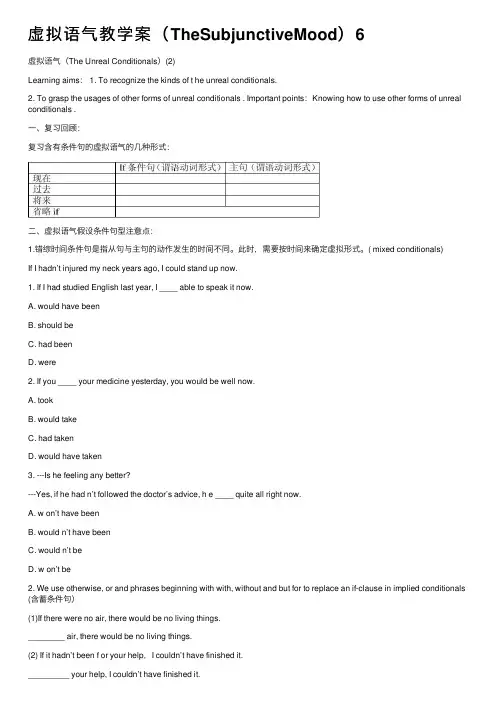
虚拟语⽓教学案(TheSubjunctiveMood)6虚拟语⽓(The Unreal Conditionals)(2)Learning aims: 1. To recognize the kinds of t he unreal conditionals.2. To grasp the usages of other forms of unreal conditionals . Important points:Knowing how to use other forms of unreal conditionals .⼀、复习回顾:复习含有条件句的虚拟语⽓的⼏种形式:⼆、虚拟语⽓假设条件句型注意点:1.错综时间条件句是指从句与主句的动作发⽣的时间不同。
此时,需要按时间来确定虚拟形式。
( mixed conditionals)If I hadn’t injured my neck years ago, I could stand up now.1. If I had studied English last year, I ____ able to speak it now.A. would have beenB. should beC. had beenD. were2. If you ____ your medicine yesterday, you would be well now.A. tookB. would takeC. had takenD. would have taken3. ---Is he feeling any better?---Yes, if he had n’t followed the doctor’s advice, h e ____ quite all right now.A. w on’t have beenB. would n’t have beenC. would n’t beD. w on’t be2. We use otherwise, or and phrases beginning with with, without and but for to replace an if-clause in implied conditionals (含蓄条件句)(1)If there were no air, there would be no living things.________ air, there would be no living things.(2) If it hadn’t been f or your help,I couldn’t have finished it._________ your help, I couldn’t have finished it.(3) If I hadn’t been busy that day, I would have gone there with them.I was busy that day. _________ I would have gone there with them.三、虚拟语⽓特殊句型:现在:过去时(were)1. wish过去:过去完成时的宾语从句将来:would/could/might+V(原).eg. I wish I _______as tall as you. (be)I wish I ____________( not eat ) so much watermelon in the past.2. would rather that 现在:过去时过去:过去完成时将来:过去时eg. I would rather you ______ (come) here now.I would rather you _____ (come) tomorrow.I would rather I ________( not tell) you that secret yesterday.3. if only意为:要是...那该多好啊; 真希望...;由其引起的感叹句,谓语动词的形式⽤虚拟语⽓。
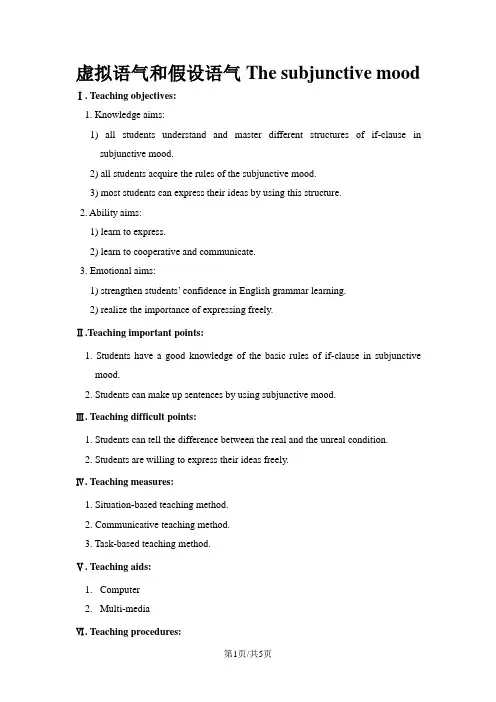
虚拟语气和假设语气The subjunctive mood Ⅰ. Teaching objectives:1. Knowledge aims:1) all students understand and master different structures of if-clause insubjunctive mood.2) all students acquire the rules of the subjunctive mood.3) most students can express their ideas by using this structure.2. Ability aims:1) learn to express.2) learn to cooperative and communicate.3. Emotional aims:1) strengthen students’ confidence in English grammar learning.2) realize the importance of expressing freely.Ⅱ.Teaching important points:1. Students have a good knowledge of the basic rules of if-clause in subjunctivemood.2. Students can make up sentences by using subjunctive mood.Ⅲ. Teaching difficult points:1. Students can tell the difference between the real and the unreal condition.2. Students are willing to express their ideas freely.Ⅳ. Teaching measures:1. Situation-based teaching method.2. Communicative teaching method.3. Task-based teaching method.Ⅴ. Teaching aids:puter2.Multi-mediaⅥ. Teaching procedures:Step 1 Lead-inShow the students a picture of my son and share a story with them.One day,I stood my son in the corner for 15 minutes as a punishment.Because he bit a kid when playing outside. He argued,“If I hadn’t bitten him,he would have taken my toy away.” Unwilling to receive the punishment,he cried:” I love you so much,but you don’t love me any longer. I wish you were not my mum! If you were not my mum,I wouldn’t be punished.” What he said really made my heartbroken. In order to make him take the matter seriously,I suggested he should be alone and calm himself down. 15 minutes later,he realized he had done something wrong and said,”I shouldn’t have bitten my friend. but what could I do?” I wanted to reason him into sensible action,can you give him some suggestions?If I were you,I ……let the students pay attention to what these sentences have in common.Step 2 Discovery1. Compare the two sentences and find the difference between a fact and a wish.1). If I am tired,I will take some rest. (a fact)2). If I were you,I would share my toy with my friend. (a wish)2. Translate the sentences and discover the basic rule of if-clause.1) 如果不是受伤太严重的话,李娜是不会退役的。
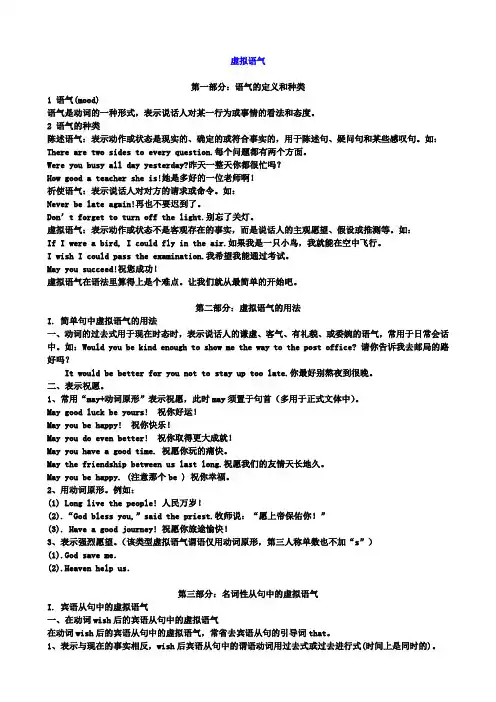
虚拟语气第一部分:语气的定义和种类1 语气(mood)语气是动词的一种形式,表示说话人对某一行为或事情的看法和态度。
2 语气的种类陈述语气:表示动作或状态是现实的、确定的或符合事实的,用于陈述句、疑问句和某些感叹句。
如:There are two sides to every question.每个问题都有两个方面。
Were you busy all day yesterday?昨天一整天你都很忙吗?How good a teacher she is!她是多好的一位老师啊!祈使语气:表示说话人对对方的请求或命令。
如:Never be late again!再也不要迟到了。
Don’t forget to turn off the light.别忘了关灯。
虚拟语气:表示动作或状态不是客观存在的事实,而是说话人的主观愿望、假设或推测等。
如:If I were a bird, I could fly in the air.如果我是一只小鸟,我就能在空中飞行。
I wish I could pass the examination.我希望我能通过考试。
May you succeed!祝您成功!虚拟语气在语法里算得上是个难点。
让我们就从最简单的开始吧。
第二部分:虚拟语气的用法I. 简单句中虚拟语气的用法一、动词的过去式用于现在时态时,表示说话人的谦虚、客气、有礼貌、或委婉的语气,常用于日常会话中。
如:Would you be kind enough to show me the way to the post office? 请你告诉我去邮局的路好吗?It would be better for you not to stay up too late.你最好别熬夜到很晚。
二、表示祝愿。
1、常用“may+动词原形”表示祝愿,此时may须置于句首(多用于正式文体中)。
May good luck be yours! 祝你好运!May you be happy! 祝你快乐!May you do even better! 祝你取得更大成就!May you have a good time. 祝愿你玩的痛快。
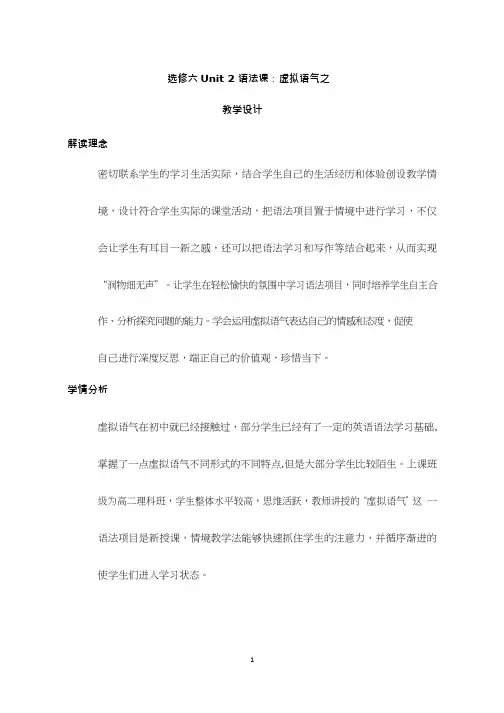
选修六Unit 2 语法课:虚拟语气之教学设计解读理念密切联系学生的学习生活实际,结合学生自己的生活经历和体验创设教学情境,设计符合学生实际的课堂活动,把语法项目置于情境中进行学习,不仅会让学生有耳目一新之感,还可以把语法学习和写作等结合起来,从而实现“润物细无声”。
让学生在轻松愉快的氛围中学习语法项目,同时培养学生自主合作、分析探究问题的能力。
学会运用虚拟语气表达自己的情感和态度,促使自己进行深度反思,端正自己的价值观,珍惜当下。
学情分析虚拟语气在初中就已经接触过,部分学生已经有了一定的英语语法学习基础, 掌握了一点虚拟语气不同形式的不同特点,但是大部分学生比较陌生。
上课班级为高二理科班,学生整体水平较高,思维活跃,教师讲授的“虚拟语气”这一语法项目是新授课,情境教学法能够快速抓住学生的注意力,并循序渐进的使学生们进入学习状态。
教师在预设的情境中,注意引导学生在交际中动态生成,学生有话可说,乐于合作分享。
用自己同学录制的视频作为铺垫,引入虚拟语气的用法,加以生活化的情境用于输出表达,相信同学们能在乐中学,学并快乐着。
教材分析“虚拟语气”是高二选修六第二单元的语法项目,在《普通高中英语课程标准》中,虚拟语气是学生要掌握的八级水平的语法项目。
虚拟语气在高中英语语法学习中非常重要,同时具有一定的难度。
虚拟语气在条件句中应用比较多。
条件句可分为两类,一类为真实条件句,一类为非真实条件句。
非真实条件句表示的是假设的或实际可能性不大的情况,故采用虚拟语气。
虚拟语气的用法很多,本课时探索“虚拟语气”的情境法教学,要求学生重点掌握if 引导的虚拟条件句的用法,掌握虚拟语气与客观事实相反的三种情况,从句和主句动词的合适使用, 体会虚拟语气所呈现的不同的情感,态度和价值观,学会运用虚拟语气表达自己的情感和态度,促使自己进行深度反思,端正自己的价值观,珍惜当下。
教学目标知识目标:掌握非真实条件句中的虚拟语气的语法规则能力目标:学会运用虚拟语气表达自己的情感和态度情感态度价值观目标:学会反思,懂得珍惜教学资源1. 高中二年级人教版选修六2. 课件3. 学生自录微视频,音频教学重点:利用不同的事例讲解虚拟语气的语法规则教学难点:如何运用虚拟语气的语法规则进行情感体验教学方法:启发式、探究式、参与式教学教学过程:壱、导入听美文”If I were a boy again”体会作者的感受,水到渠成地引出虚拟语气。
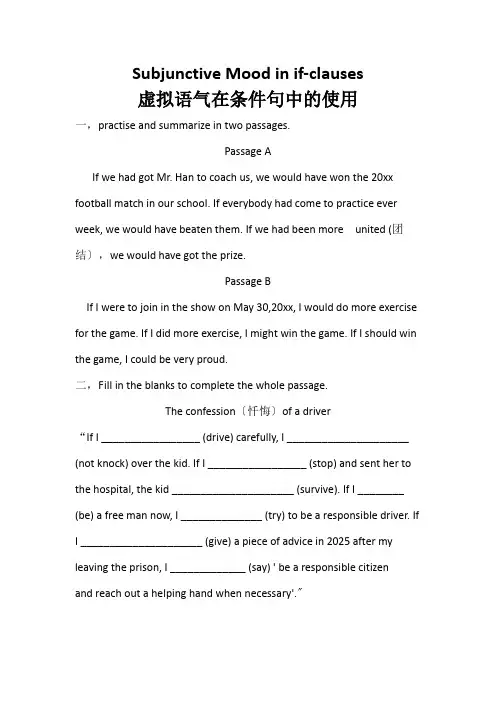
Subjunctive Mood in if-clauses虚拟语气在条件句中的使用一,practise and summarize in two passages.Passage AIf we had got Mr. Han to coach us, we would have won the 20xx football match in our school. If everybody had come to practice ever week, we would have beaten them. If we had been more united (团结〕,we would have got the prize.Passage BIf I were to join in the show on May 30,20xx, I would do more exercise for the game. If I did more exercise, I might win the game. If I should win the game, I could be very proud.二,Fill in the blanks to complete the whole passage.The confession〔忏悔〕of a driver“If I _________________ (drive) carefully, I _____________________ (not knock) over the kid. If I _________________ (stop) and sent her to the hospital, the kid _____________________ (survive). If I ________ (be) a free man now, I ______________ (try) to be a responsible driver. If I _____________________ (give) a piece of advice in 2025 after my leaving the prison, I _____________ (say) ' be a responsible citizenand reach out a helping hand when necessary'.〞If time could be turned backMy regrets___________________________________________________________ ___________________________________________________________ ___________________________________________________________ ___________________________________________________________ ___________________________________________________________ ___________________________________________________________ ___________________________________________________________ ___________________________________________________________ ___________________________________________________________ ___________________________________________________________ ___________________________________________________________ ___________________________________________________________ ___________________________________________________________Guidance:1.If I should be given the opportunities to travel to the past, I would like to go back to.....2.If I could travel back through time, I would not have.....3.If time could be turned back, I would....。
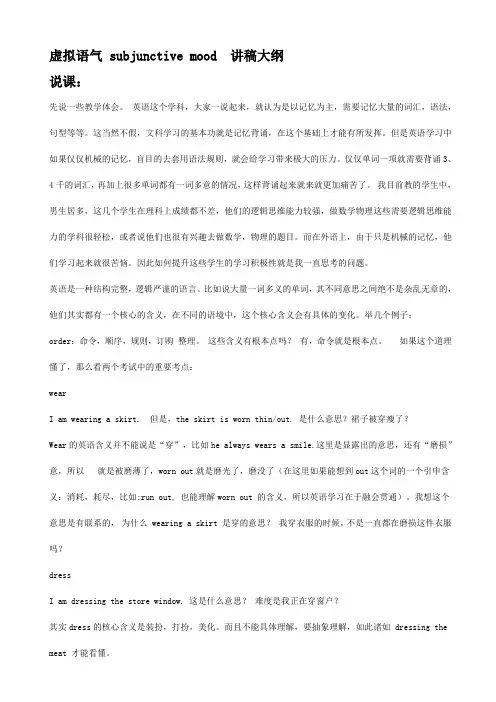
虚拟语气 subjunctive mood 讲稿大纲说课:先说一些教学体会。
英语这个学科,大家一说起来,就认为是以记忆为主,需要记忆大量的词汇,语法,句型等等。
这当然不假,文科学习的基本功就是记忆背诵,在这个基础上才能有所发挥。
但是英语学习中如果仅仅机械的记忆,盲目的去套用语法规则,就会给学习带来极大的压力。
仅仅单词一项就需要背诵3、4千的词汇,再加上很多单词都有一词多意的情况,这样背诵起来就来就更加痛苦了。
我目前教的学生中,男生居多,这几个学生在理科上成绩都不差,他们的逻辑思维能力较强,做数学物理这些需要逻辑思维能力的学科很轻松,或者说他们也很有兴趣去做数学,物理的题目。
而在外语上,由于只是机械的记忆,他们学习起来就很苦恼。
因此如何提升这些学生的学习积极性就是我一直思考的问题。
英语是一种结构完整,逻辑严谨的语言。
比如说大量一词多义的单词,其不同意思之间绝不是杂乱无章的,他们其实都有一个核心的含义,在不同的语境中,这个核心含义会有具体的变化。
举几个例子:order:命令,顺序,规则,订购整理。
这些含义有根本点吗?有,命令就是根本点。
如果这个道理懂了,那么看两个考试中的重要考点:wearI am wearing a skirt. 但是,the skirt is worn thin/out. 是什么意思?裙子被穿瘦了?Wear的英语含义并不能说是“穿”,比如he always wears a smile.这里是显露出的意思,还有“磨损”意,所以就是被磨薄了,worn out就是磨光了,磨没了(在这里如果能想到out这个词的一个引申含义:消耗,耗尽,比如:run out, 也能理解worn out 的含义,所以英语学习在于融会贯通)。
我想这个意思是有联系的,为什么 wearing a skirt 是穿的意思?我穿衣服的时候,不是一直都在磨损这件衣服吗?dressI am dressing the store window. 这是什么意思?难度是我正在穿窗户?其实dress的核心含义是装扮,打扮,美化。
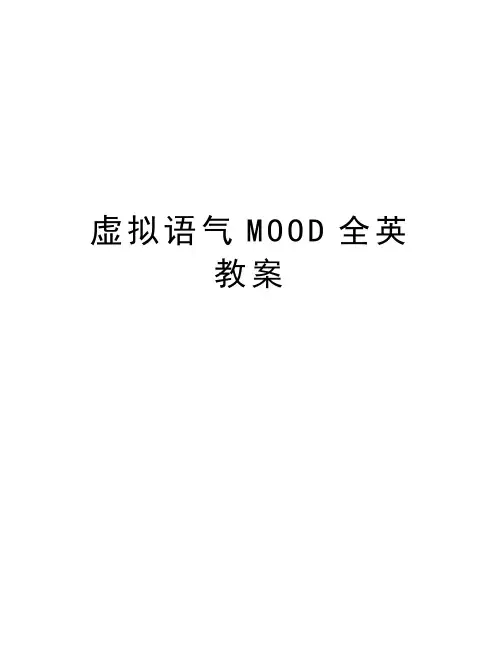
虚拟语气M O O D全英教案VERB (VI) MOOD10.1“Mood” is the form of the verb which shows the speaker’s attitude towards the relation between the action (or state) expressed by the predicate verb and the objective reality. [语气是一种动词形式,用来表示讲话人对谓语动词所表示的动作(或状态)与客观实际之间的关系的态度。
]There are three moods: the indicative mood, the imperative mood and the subjunctive mood.10.2 The indicative mood (fact-mood事实语气) shows that the speaker considers the action or state denoted by the predicate as an actual fact. It is used in statements (both affirmative or negative) of facts, in questions of facts and in exclamations of facts, e.g.The forces of the third world are growing from day to day. (affirmative statement) She didn’t help me with my work. (negative statement)Will it do if we let you have an answer by Friday? (question)How hot it is today! (exclamation)10.3 The imperative mood (will-mood意志语气) conveys the speaker’s will to urge the person addressed to fulfil an action. This may be expressed in the form of a command, a request, a warning, etc.1) It has only one simple form (i.e. the plain root form of the verb) for the second person singular or plural, e.g.Give him what help you can.Do not make the same mistake again.The subject of an imperative is seldom expressed unless it is emphatic. If it is emphatic, the subject is placed before the verb in the usual place of the subject, e.g.You be more careful. (Lawrence)“Don’t you lose a minute.” (Conrad)With the first and the third person it is preceded by “let” (or “have”) and an accusative, e.g.Let me see. (让我想一想,让我看一看。
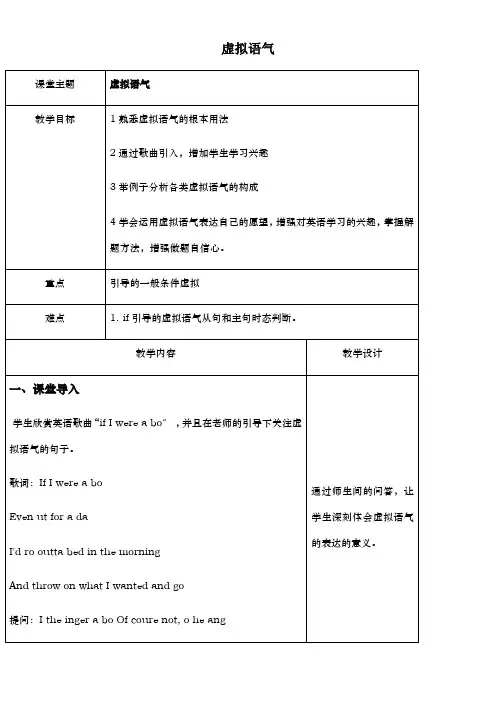
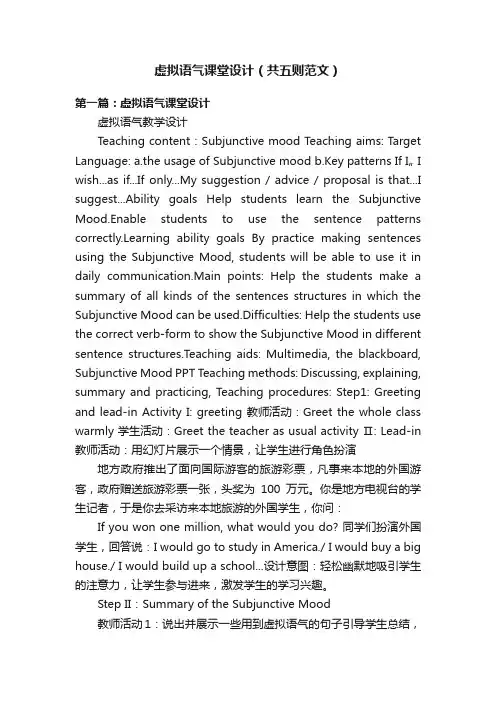
虚拟语气课堂设计(共五则范文)第一篇:虚拟语气课堂设计虚拟语气教学设计Teaching content:Subjunctive mood Teaching aims: Target Language: a.the usage of Subjunctive mood b.Key patterns If I (I)wish...as if...If only...My suggestion / advice / proposal is that (I)suggest...Ability goals Help students learn the Subjunctive Mood.Enable students to use the sentence patterns correctly.Learning ability goals By practice making sentences using the Subjunctive Mood, students will be able to use it in daily communication.Main points: Help the students make a summary of all kinds of the sentences structures in which the Subjunctive Mood can be used.Difficulties: Help the students use the correct verb-form to show the Subjunctive Mood in different sentence structures.Teaching aids: Multimedia, the blackboard, Subjunctive Mood PPT Teaching methods: Discussing, explaining, summary and practicing, Teaching procedures: Step1: Greeting and lead-in Activity I: greeting 教师活动:Greet the whole class warmly 学生活动:Greet the teacher as usual activity Ⅱ: Lead-in 教师活动:用幻灯片展示一个情景,让学生进行角色扮演地方政府推出了面向国际游客的旅游彩票,凡事来本地的外国游客,政府赠送旅游彩票一张,头奖为100万元。
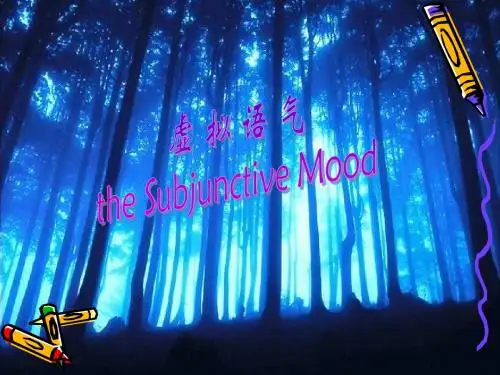
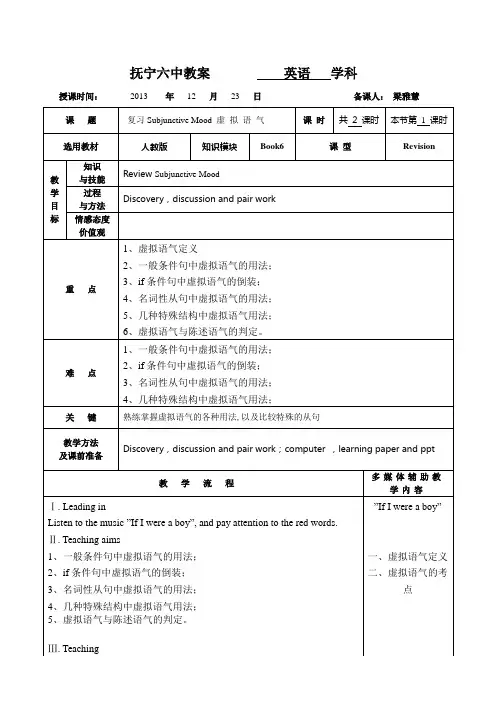
VERB (VI) MOOD10.1“Mood” is the form of the verb which shows the speaker’s attitude towards the relation between the action (or state) expressed by the predicate verb and the objective reality. [语气是一种动词形式,用来表示讲话人对谓语动词所表示的动作(或状态)与客观实际之间的关系的态度。
]There are three moods: the indicative mood, the imperative mood and the subjunctive mood.10.2 The indicative mood (fact-mood事实语气) shows that the speaker considers the action or state denoted by the predicate as an actual fact. It is used in statements (both affirmative or negative) of facts, in questions of facts and in exclamations of facts, e.g.The forces of the third world are growing from day to day. (affirmative statement)She didn’t help me with my work. (negative statement)Will it do if we let you have an answer by Friday? (question)How hot it is today! (exclamation)10.3 The imperative mood (will-mood意志语气) conveys the speaker’s will to urge the person addressed to fulfil an action. This may be expressed in the form of a command, a request, a warning, etc.1) It has only one simple form (i.e. the plain root form of the verb) for the second person singular or plural, e.g.Give him what help you can.Do not make the same mistake again.The subject of an imperative is seldom expressed unless it is emphatic. If it is emphatic, the subject is placed before the verb in the usual place of the subject, e.g.You be more careful. (Lawrence)“Don’t you lose a minute.”(Conrad)With the first and the third person it is preceded by “let” (or “have”) and an accusative, e.g.Let me see. (让我想一想,让我看一看。
教师学科教案[ 20 – 20 学年度第__学期]任教学科:_____________任教年级:_____________任教老师:_____________xx市实验学校The Subjunctive Mood(虚拟语气)教案设计一.Teaching aims1.Master the basic structures and types of subjunctive mood.2.Learn to use the subjunctive mood to make sentences.3.Cultivate the students’ abilities of analyzing and solving the problems.二.Teaching important pointLet the students understand some basic structures and types of subjunctive mood and learn how to use them.三.Teaching difficult pointConclude some special usages of subjunctive mood, especially in the objective clause and adverbial clause.四.Teaching aidsMultimedia, blackboard, chalks五.Teaching methodsDiscussing, cooperating, concluding, practicing六.Teaching proceduresStep I Self-directed study(利用几个特殊的句子作为例子供学生们阅读,领会其中的含义,回顾虚拟语气的用法)Read the following sentences and translate them into Chinese.1. If I were a bee, I would work much harder.2. I wish I were a bird.3. He suggested that we should go home earlier.4. It’s high ti me that we should study hard.5. If only I were a millionaire.6. He treats the little girl as if she were his own daughter.7. But for your help, we couldn’t have succeed.8. I was ill that day. Otherwise, I would have taken part in the sports meeting.Step II Cooperative study(小组探讨分析虚拟语气在状语从句,宾语从句中的用法,分组总结归纳if引导的非真实条件句主句和从句谓语动词的使用,wish后宾语从句谓语动词的形式,含有otherwise,but for, without 等词的条件句中主句谓语动词的形式,suggest,demand, insist, order等表建议、要求、坚持、命令等动词后宾语从句中谓语动词的使用,It’s high time that 后从句谓语动词的形式)Have a discussion of the sentences above, then conclude the basic structures and types of subjunctive mood.1.The adverbial clauses introduced by ‘if, if only, as if’2.The objective clauses used after ‘wish, suggest, insist…’3.Some other types with the words ‘otherwise, but for, without’4.It’s high time that…Step III Feedback(各小组展示讨论的结果,检测学生们对虚拟语气这一知识点的概括归纳能力)3. Some other types with the words ‘otherwise, but for, without’4. The objective clauses used after ‘suggest, insist…’S +suggest/ advise/propose/recommend/ insist/advocate/urge/order/command/demand require/request/ask…+(that)+S.+ +…5.It is high time that +S+ +V+…It is high time that +S+ +…Step IV Explaining the key points(教师对学生们在展示过程中出现的问题进行点评,强调几个虚拟语气常考的难点知识,便于学生们掌握重点,突破难点)1.Different usages of ‘if’ in the adverbial clause(1)The football match will be put off if it______(rain).(2)I would study harder if I (be) you.2.The inversion in subjunctive moodIn the subjunctive mood, if we want to omit ‘if’, we’ll have to put the words ‘were, had, should’ ahead the subject.----If I were Obama’s daughter, I would be happy.---- I Obama’s daughter, I would be happy.3.Special usages of subjunctive mood introduced by ‘if’If they had studied hard, they (do)it easily now.4.The usages of ‘suggest, insist’ in subjunctive moodIn the subjunctive mood, ‘suggest’ means advise, and ‘insist’ means demand.My teacher insisted that the homework (be) easy and insisted that we (finish) it on time.5. Other adverbial clauses with ‘otherwise, but for, without, or, but…’Without your help, we (succeed).Step V Consolidation and practice(要求学生对所学知识进行总结归纳,同时将前两年在高考真题中考察虚拟语气的题目再现学生,通过真题演练检测学生们的课堂学习效果,以组为单位进行探讨分析)Make a conclusion of the main contents and finish the exercises to consolidate the ability of application.①(2014,湖南,22)If Mr. Dewey _____ present, he would have offered any possibleassistance to the people there.A. wereB. had beenC. should beD. was②(2014,浙江,16)They were abroad during the months when we were carrying outthe investigation, or they _____ to our help.A.would have come B.could comeC.have come D.had come③(2014,福建,32) no modern telecommunications, we would have to wait forweeks to get news from around the world.A. Were thereB. Had there beenC .If there are D. If there have been④(2014,天津,15)________ the morning train, he would not have been late for themeeting.A. Did he catchB. should be catchC. has he caughtD. Had he caught⑤(2013,天津,14)If he had spent more time practicing speaking English before, heable to speak it much better now.A.will beB. would beC. has beenD. would have been⑥(2013,北京,34)If we a table earlier, we couldn’t be standing here in aqueue.A. have bookedB. bookedC. bookD. had booked⑦(2013,江苏,30)I should not have laughed if I you were serious.A. thoughtB. would thinkC. had thoughtD. have thought⑧(2013,陕西,12)My mom suggests that we eat out for a change thisweekend.A. shouldB. mightC. couldD. would⑨(2013,浙江,8) Eye doctors re commend that a child’s first eye exam ______ at theage of six months old.A. wasB. beC. wereD. is⑩(2013,安徽,28)I to my cousin’s birthday party last night, but I was not availableA. wentB. had goneC. would goD. would have gone Step VI Homework(为了让学生进一步掌握虚拟语气的用法,要求学生再次总结其用法并举例说明,加深理解,搜集并研究2012、2011、2010这三年各省高考真题中虚拟语气的题目。
《虚拟语气教案》一、教学目标1. 让学生理解虚拟语气的概念和用法。
2. 培养学生正确运用虚拟语气进行表达的能力。
3. 提高学生对英语语法的认识和运用水平。
二、教学内容1. 虚拟语气的定义和分类2. 虚拟语气的构成和用法3. 虚拟语气在各种从句中的应用4. 虚拟语气在条件句和愿望句中的应用5. 虚拟语气在非真实条件句和虚拟语气句中的应用三、教学重点与难点1. 虚拟语气的概念和分类2. 虚拟语气的构成和用法3. 虚拟语气在各种从句中的应用4. 虚拟语气在条件句和愿望句中的应用5. 虚拟语气在非真实条件句和虚拟语气句中的应用四、教学方法1. 讲授法:讲解虚拟语气的概念、分类、构成和用法。
2. 案例分析法:分析虚拟语气在各种从句中的应用。
3. 练习法:让学生通过练习掌握虚拟语气的运用。
4. 互动法:引导学生进行小组讨论,提高学生的参与度和积极性。
五、教学步骤1. 导入:通过一个谜语引出虚拟语气的概念,激发学生的兴趣。
2. 讲解:讲解虚拟语气的定义、分类、构成和用法。
3. 案例分析:分析虚拟语气在各种从句中的应用。
4. 练习:让学生进行虚拟语气的练习,巩固所学知识。
5. 互动讨论:分组讨论虚拟语气在条件句和愿望句中的应用。
6. 总结:对本节课的内容进行总结,强调虚拟语气的重要性和运用。
7. 作业布置:布置相关练习题,让学生课后巩固虚拟语气的运用。
六、教学拓展1. 介绍虚拟语气的其他用法,如虚拟语气在评论、建议、命令等句子中的应用。
2. 讲解虚拟语气与现实世界的联系,让学生了解虚拟语气在表达非现实情况时的作用。
3. 通过实例展示虚拟语气在文学作品、电影、广告等中的运用,提高学生对虚拟语气的认识。
七、课堂练习1. 编写一些关于虚拟语气的练习题,包括选择题、填空题和改错题,让学生进行练习。
2. 设计一个虚拟语气的小场景,让学生进行角色扮演,运用虚拟语气进行交流。
八、作业设计1. 布置一些有关虚拟语气的练习题,让学生课后巩固所学知识。
虚拟语气the Subjunctive Mood的教学设计 (外研版英语高考复习)Teaching aimsEnable the students to master the usage of the Subjunctive mood.Teaching important pointsHow to enable the students to know the structure and the usage of the Subjunctive mood.Teaching difficult pointsHow to help the students to master the usage of the Subjunctive mood.Step1 Pre-task activities1. Group workIf I were a bird, I would fly in the sky.由此引入授课内容,主语是I,be 动词怎么用were?不是am或was?会不会是老师弄错了?调动学生的好奇心和学习兴趣。
然后,以AIDS为主题学习虚拟语气。
Get Ss to collect more information about AIDS, such as pictures, news and so on before class.2. BrainstormLet the Ss say as many words concerned with the topic AIDS as they can.HIV: Bad People: Incurable:Inject drugs: AIDS: Disease:Symptoms: Virus: Giving blood:3. Lead-inPlay a short film directed by Liu Dehua which calls for people to have a correct attitude towards people infected with HIV or have AIDS and help people know more about AIDS.Step2 Task-cycle activitiesTask1. Topic focusGet Ss to make a report about what they know about AIDS through information collecting. Meanwhile they can show pictures by using the multimedia. Such as “ December 1st is the World AIDS Day; “The red ribbon is the national symbol of HIV and AIDS Awareness,” “ Each year, more than 5 million become infected with HIV,” etc.Task2. Inquiry learningAsk the Ss to use grammatical materials given and refer to their reference books to find out the rules of the subjunctive mood by group work.Read the following sentences below. Give your explanation about the sentences and write out your understanding rule.Sentences ( Example )Your explanationRulesI wish I could fly like a bird.It’s a pity I can’t fly.Wish that (i)He wishes she were my friendIf I were you, I would give an AIDS patient a hug.If I had HIV, I would know because I would feel sick.Give Ss a few minutes to discuss, then each group send a representative to make a conclusion and then the whole class work together to sum up the uses as the followings, the teacher gives help when necessary.if虚拟条件句主句从句与现在事实相反过去时;be动词用werewould / should 等+动词原形与过去事实相反would / should / 等 + have donehad done与将来事实可能相反过去时should +动词原形were to +动词原形would / should 等+动词原形wish从句虚拟语气主句从句从句动作先于主句动词动作(be的过去式为 were)现在时过去时从句动作与主句动作同时发生(had + 过去分词)过去时过去完成时将来不大可能实现的愿望将来时would/could +动词原形Task3 DiscussionLet Ss make wishes using the Subjunctive Mood of different tenses in groups of four.Step3 Post-task activities1. InterviewingAsk the Ss to work in pairs, playing the role of a newspaper reporter and Li Hua, using the Subjunctive Mood. Finally invite some pairs to act out their interview in the front.2. WritingAsk the Ss to write an interview dialogue after the interview, trying to use the Subjunctive Mood Learned in this period.3. Summary1.We can also use the subjective mood to talk about something unreal or untrue.2.The subjective mood can be used to show that something is important, necessary or suggested.homework1) 整理记录小组活动中你给予别人的和别人给你的建议及其它对话中用到的虚拟语气的句子。
虚拟语气教案设计虚拟语气教案设计第三章虚拟语气虚拟语气(the subjunctive mood),又称假设语气,是谓语动词的一种形式,表示说话人叙述的内容与事实相反,在现实中并不存在,或实现的可能性很小。
一、动词的语气语气用来区别讲话人对某一行为或事情的看法和态度。
英语中的语气(mood)有三种,分别是陈述语气、祈使语气和虚拟语气。
1.陈述语气陈述语气一般用来叙述事实或就事实提出询问,主要用于陈述句、疑问句和某些感叹句。
Where there is a will, there's a way. 有志者事竟成。
Can you help me carry the box upstairs 你能帮我把箱子搬到楼上吗?How I missed the life in the countryside! 我多么想念乡村的生活啊!2.祈使语气祈使语气表示说话人向对方提出请求或下达命令。
Come this way, please! 请这边走。
Don't make any noise, will you 别吵,行吗?Do be careful when crossing the street. 过马路时一定要小心。
3.虚拟语气虚拟语气表示动作或状态不是客观存在的事实,而是说话人的主观愿望、假设或推测等。
If I were a bird, I could fly in the air. 如果我是一只小鸟,我就能在空中飞行。
I wish it were spring all the year round. 但愿四季如春。
May good luck be yours! 祝你好运!二、条件句中的虚拟语气英语中条件从句有两类,一类是真实条件句,另一类是非真实条件句。
如果假设的情况可能发生,是真实条件句;如果假设的情况是不存在的或不大可能发生的,则是虚拟条件句。
A.真实条件句真实条件句表示的假设是可能发生或实现的,主句和从句的谓语动词都要用陈述语气。
VERB (VI) MOOD10.1“Mood” is the form of the verb which shows the speaker’s attitude towards the relation between the action (or state) expressed by the predicate verb and the objective reality. [语气是一种动词形式,用来表示讲话人对谓语动词所表示的动作(或状态)与客观实际之间的关系的态度。
]There are three moods: the indicative mood, the imperative mood and the subjunctive mood.10.2 The indicative mood (fact-mood事实语气) shows that the speaker considers the action or state denoted by the predicate as an actual fact. It is used in statements (both affirmative or negative) of facts, in questions of facts and in exclamations of facts, e.g.The forces of the third world are growing from day to day. (affirmative statement)She didn’t help me with my work. (negative statement)Will it do if we let you have an answer by Friday? (question)How hot it is today! (exclamation)10.3 The imperative mood (will-mood意志语气) conveys the speaker’s will to urge the person addressed to fulfil an action. This may be expressed in the form of a command, a request, a warning, etc.1) It has only one simple form (i.e. the plain root form of the verb) for the second person singular or plural, e.g.Give him what help you can.Do not make the same mistake again.The subject of an imperative is seldom expressed unless it is emphatic. If it is emphatic, the subject is placed before the verb in the usual place of the subject, e.g.You be more careful. (Lawrence)“Don’t you lose a minute.”(Conrad)With the first and the third person it is preceded by “let” (or “have”) and an accusative, e.g.Let me see. (让我想一想,让我看一看。
)Let us help you. (让我们帮助你吧。
)Let’s go. (The second person is included in “us”, which is shortened to ‘s.) (咱们走吧。
)2) The imperative mood may be used to express a condition in a compound sentence, e.g.Make haste and you will accomplish the work on time. (If you make haste, you will accomplish the work on time.)3) The emphatic imperative is formed with the help of the auxiliary verb “do”, e.g.Do work harder.Do be silent.4) “Will you?” is often added to the imperative, e.g.Bring me that dictionary, will you?5) “Shall we?” is often added to such an imperative sentence as follows:Let’s go, shall we?10.4 The subjunctive mood (thought-mood想象语气) doesn’t refer to facts but the speaker’s thought. It expresses wishes, suggestions, supposition, etc., e.g.I wish I could see him immediately. ---wish (the fact is that I can’t see him immediately.)He suggests that the regulations [should] be revised at once. ---- suggestion (Whether the regulations will be revised at once is uncertain though he suggest that they should.) If I had had time last week, I should have come to see you. -----supposition.(I had no time last week, so I didn’t come to see you.)10.5 The Use of the Subjunctive in the Unreal Conditional SentenceConditional sentences may be divided into two kinds: real conditional sentences and unreal conditional sentences. Both refer to supposition.1)In sentences of real condition the indicative mood is used because the supposition may come true, e.g.You can finish the work by yourself if you try hard.If it rains, I shall stay at home.2)In unreal conditional sentences the verbs are in the subjunctive mood because the supposition in such sentences is either doubtful or contrary to the fact, e.gIf I were you (but, in fact, I can’t be you) I would study much harder. ----contrary to the fact If I should have free time tomorrow (but I don’t think I shall have free time ), I would help you with your grammar. ------- future doubtful suppositionCompare the following:a.I am sure whether I’ll see him. (indicative)But if I see him, I will ask him to come. (real condition)b.I didn’t meet him there. (indicative)If I had met him there, I would have asked him to come. (unreal condition)3) A sentence of unreal condition may refer to the present, the past, or the future. It may also refer to no particular time. The following are various verb forms for it according to sense and some points for attention:Other examples:If he were here now, he would not let the matter end this way (but he is not here)How nice it would be if I were there now.Note 1) With the verb “to be”, “were” is used for all persons and both numbers in the past form. In colloquial speech, “was” is often used instead of “were” for the first and the third person singular. Nevertheless, we must say “If I (he, she) were (not was) yo u…”Note 2) The above verb form is also used in the supposition contrary to the fact referring to no particular time, e.g.If there were no water, there would be no life on the earth.No matter how perfect the bird’s wing is, it could never lift the bird if it were not supported by air.Note 3) The above verb form is also used in the sentence of rejected concession (虚拟让步句) referring to the present, e.g.Even if I were there, I shouldn’t be able to solve the problem by myself. (In fact, I am not there.) ------referring to the presentEven though we didn’t have needed materials, we should (would) find substitutes for them.Cf: Even if I had been there, I shouldn’t (wouldn’t) have been able to solve the problem bymyself. (In fact, I was not there.) ----- referring to the pastOther examples:If he had not been ill and missed many classes (but he was ill and missed many classes), he would have made greater progress.Note: this form may also be used to refer to certain cases of future doubtful supposition, e.g.If you hadn’t finished the work by the end of this month, you would probably be criticized.If he hadn’t got back by the time you come again, he would certainly have been at the seaside in others’ company.(c)Future doubtful suppositionThere are three tense forms expressing the future doubtful supposition:“Result” clause in each sentence refer to two actions which occur at the same time. If the actions expressed in the two clauses do not take place at the same time, different tense forms are used as the sense requires.Examine the following examples:If China had not been liberated (contrary to the past fact), the peasants and workers would still be leading a miserable life (contrary to the present fact).If the criminal were honest (contrary to the fact),he would have made a clean breast of the whole thing long ago (contrary to the past fact).Note 2) “should”or “would”can be replaced by “could”or “might”, etc. as the sense requires, e.g.If he could help me, he would. (He can’t help me.)If he would help us, he could. (He won’t help us though he can.)If he might come, he would come early. (He may not come.)Note 3) In unreal conditional sentences expressing future doubtful supposition, the root form of the verb may be used in the “If” clause and “shall” (“will”, “can”, “may”) can be used instead of “should” (“would”, “could”, “might”) in the “Result” clause. Compare sentences (1), (2) and (3) in the following groups:A (1) If he is hard-working, why can’t he fulfil the plan ahead of schedule? (I think he willprobably be hard-working.)(2) If he should be hard-working, he could fulfil the plan on time. (It seems that he won’t be hard-working.)(3) If he be hard-working, he will (would) fulfil the plan on time. (I don’t know whether he will be hard-working.)B(1) If he knows it, he will tell us. (It seems he will know it. )(2) If he should know it, he would tell us. (It seems he won’t know it. )(3) If he know it, he will (would) tell us. (Whether he will know it is uncertain. )In sentences A (2) and B (2), while the subjunctive mood is used in the “If”clauses, the indicative mood may be used in the “Result” clauses. Thus, A(2) and B (2) turn into: If he should be hard-working, he can fulfil the plan on time.If he should know it, he will tell us.Here, “should be” and “should know” do not express suppositions contrary to anticipation but uncertainty. They may be replaced by the present forms “is”and “knows”respectively and the sentences will thus become real conditional.Besides, the imperative mood may be used in the “Result” clauses if the verb form of the “If”clauses if “should + root form”, e.g.If you should see John, give him my regards.If she should fail this time, tell her to try again.Note 4) The conjunction “if” is frequently omitted before were, should, could, had, etc. In this case the subject of the clause stands after them, e.g.Had you (= If you had) invited us, we would have come to your party.Were I (= If I were) you, I would do more practice after class.Note 5) “Supposing”, “unless”, “in case”, “provided (that)” etc. can be used as the conjunction instead of “if”, e.g.Supposing they were not there, what should we do?Unless they should invite me, I wouldn’t go there.Take an umbrella with you in case it should rain.Note 6) The meaning of the conditional clause (referring to either an unreal condition or a real condition) may be implied in a phrase, a clause or the context, e.g.With your assistance (= If we had your assistance), we might finish the plan carlier.Without heavy industry (= If there were no heavy industry). The plans for mechanization and electrification of agriculture would be impossible. But for your co-operation (= If it hadn’t been for your co-operation), our meeting wouldn’t have been so successful.A more responsible man would have acted differently. (= If he had been a more responsible man, he would have acted differently.)10.6 Other Uses and Corresponding Forms of the Subjunctive1) In the simple sentence to express desire, e.g.Glory [be] to the people!Long live the People’s Republic of China !Note : A verb phrase forms with the modal verb “may” is often used to express desire, e.g.May they be successful!Cf: They may be successful. (indicative)2) In subordinate clauses:(1) To express wish (an unfulfilled desire or a desire that is unlikely to be fulfilled), e.g.I wish [that] he were not so agitated= It is a pity (or I am sorry) [that] he is so agitated.I wish (or: wished) I had gone (or: could have gone) to the football last night. = I am (or: was) sorry that I didn’t (or: couldn’t) go to the football match last night.I wish the boys would be quiet. = It is a pity [that] the boys won’t be quiet.(2) To express rejected manner (comparison), e.g.The whole family greeted me as though I were one of the family.They also talk peace and have repeatedly made gestures as if they were willing to ease international tension. (In fact, they are unwilling to ease international tension.) The enemy acts as if he had known our plan already.We should change the plan.(3) To express rejected concession, e.g.Though he criticize me I will not be hurt.Whether the information be true or not, we must be vigilant.However hard it rain, I shall go.(4) To express apprehension, e.g.In case the wall should collapse, they evacuated the building.I hesitate to come frequently, for fear that I should offend him.She ran as fast as she could lest he [should] miss the first bus. (now rather archaic)(5) To express indirect commands and suggestions (after such verbs as suggest, propose, move, insist, demand, recommend, desire, order), e.g.I demand that this [should] be done.I desire that he [should] study hard.I insist that Thomas [should] do his work alone.He ordered that the medicines [should] be sent by special plane.Cf: He issued the orders that the work be done at once. (appositive clause)What I advise is that he keep regular hours. (predicative clause)It is necessary that the customs of all national minorities [should] be respected.The absence of “should” in these sentences is quite common in American English.But : It is [high] time that we went (or should go) back to our work again.(6) To express emotion, e.g.It is strange that he should have said so.I am surprised that he should not realize his own mistakes.It is a great pity that he should be so careless.Note: In these sentences, the indicative mood may be used in the subordinate clauses. The use of “should” in these three sentences is to emphasize the strangeness, surprise or feeling of pity.。